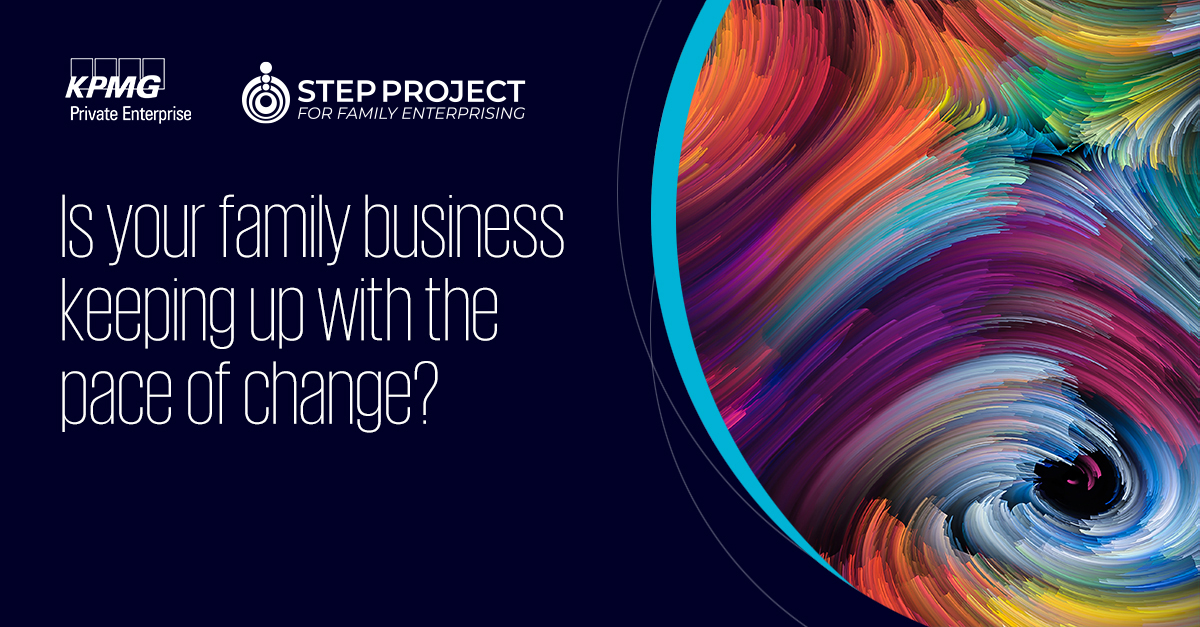Could a sea change be ahead in family business?

In a post-pandemic world, many new opportunities and challenges lie ahead for family-owned businesses and business families.
Recent research conducted by the STEP Project Global Consortium in collaboration with KPMG Private Enterprise, Mastering a Comeback: How family businesses are triumphing over Covid-19, highlighted the unique characteristics and competitive advantages of family businesses, and how those have put them at the forefront of economic recovery around the world.
Not the least of these unique characteristics is the powerful impact of multigenerational family involvement. There is no question that Covid-19 presented historic social, environmental and financial challenges and opportunities. And in our research, we found that businesses with multiple generations in the firm were 45% more likely to implement a business transformation strategy than single-generation family firms.
As family members across the generations came together to deal with swiftly accelerating challenges and opportunities, there was a realisation that the transformation of the business itself was needed. It has been my experience that this has opened important conversations within families to ensure that the right leadership is in place to deal with what will likely continue to be a volatile, complex and ambiguous business and social environment for the foreseeable future.
 Several trends that were an outcome of the pandemic are not likely to abate: digital transformation and the adoption of new technology; streamlined operating practices; rapidly increasing attention to environmental, social and governance (ESG) issues; and greater appreciation for the influence and decision-making power of the customer and the need to find better ways to connect with customers and suppliers.
Several trends that were an outcome of the pandemic are not likely to abate: digital transformation and the adoption of new technology; streamlined operating practices; rapidly increasing attention to environmental, social and governance (ESG) issues; and greater appreciation for the influence and decision-making power of the customer and the need to find better ways to connect with customers and suppliers.
Without question, the pandemic has been transformative. And I believe it has provided an exceptional opportunity to leverage family business-style relationships to transform the current business model and guide the family and the business forward for even greater competitive advantage.
Who will navigate the transformation?
Throughout the months of the pandemic, I experienced many family businesses that worked collaboratively across multiple generations of the family to make change happen—and to do it with speed. Not only did younger members of the family search for better answers and uncover new opportunities, they also used their influence to encourage a whole new approach for tackling the reality of the changes and leading the business in new directions.
 As days and months went by, it became increasingly evident that many younger-generation family members have the progressive ideas that are going to be important and relevant to respond successfully to a continued acceleration in market changes. What mechanisms will need to be in place to recognise the trends and opportunities as they arise and keep bringing fresh ideas to the surface? Increasingly, the answer to this question is leading to critical (and sometimes challenging) conversations among families about the need for a new leadership approach.
As days and months went by, it became increasingly evident that many younger-generation family members have the progressive ideas that are going to be important and relevant to respond successfully to a continued acceleration in market changes. What mechanisms will need to be in place to recognise the trends and opportunities as they arise and keep bringing fresh ideas to the surface? Increasingly, the answer to this question is leading to critical (and sometimes challenging) conversations among families about the need for a new leadership approach.
What’s on the transformation agenda?
In recent conversations with business families, many are closely examining the efficiency of their operating processes, looking for ways to access new market channels, and searching for better ways to connect with customers and suppliers to create a sustainable future.
A s their focus on addressing environmental, social and governance issues intensifies, they are making important decisions about the most critical aspects of their ESG strategy and the associated investment priorities—from ensuring an ethical supply chain, to decarbonisation, access to sustainable finance or satisfying customer choice.
s their focus on addressing environmental, social and governance issues intensifies, they are making important decisions about the most critical aspects of their ESG strategy and the associated investment priorities—from ensuring an ethical supply chain, to decarbonisation, access to sustainable finance or satisfying customer choice.
I believe that family businesses will continue to outperform others by adopting specific leadership styles and approaches that continuously reinvigorate their firms. Increasing the diversity of decision-making within the family, creating innovative solutions, leveraging the power of digital technology and getting on the front foot of the ESG agenda, will not only strengthen the financial performance of their businesses, but satisfy the non-financial goals of the family as well.
Where are you today?
At KPMG Private Enterprise, we continue to be committed to exploring these and other issues facing family businesses. And I would like to invite you to share your views and participate in our latest global family business survey conducted by the Successful Transgenerational Entrepreneurship Practices (STEP) Project Global Consortium in collaboration with KPMG Private Enterprise.
 By combining applied research with the shared experiences of academics and advisers who work closely with business families, we’re able to offer meaningful insights that can help you and other family business leaders learn from each other’s experiences. Our goal is to provide you with practical considerations for advancing your business.
By combining applied research with the shared experiences of academics and advisers who work closely with business families, we’re able to offer meaningful insights that can help you and other family business leaders learn from each other’s experiences. Our goal is to provide you with practical considerations for advancing your business.
It only takes 15 minutes to complete the survey. It’s completely confidential and explores the impact of the pandemic on diversity in strategic-decision-making, multigenerational involvement of family members and potential changes in leadership and stewardship in family businesses.
Click here to access the survey, which closes on 31 October, 2021. Please note: the respondent should be the senior family leader in the business—generally the chief executive, chairman of the board or family council, primary shareholder or in another leadership role.
We would welcome your contribution and look forward to sharing the results and insights with you.






